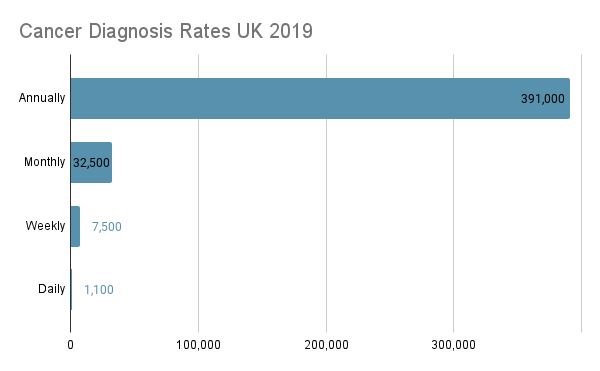This guide will explore when you could be eligible to claim if a GP failed to diagnose cancer. If a doctor failed to diagnose cancer in a timely manner or they misdiagnosed you with a different condition, you could experience further harm. In some cases, it could be fatal. We will explore the eligibility criteria for seeking compensation in further detail throughout our guide.

Additionally, we will look at the duty of care medical professionals owe their patients and how a failure to diagnose a condition could occur if this duty is breached.
We will also look at the steps you can take to build a strong claim, such as gathering evidence and seeking legal advice.
Furthermore, this guide will discuss the compensation you could be owed and how it’s calculated.
Please continue reading for more information. Alternatively, you can get in touch with our team of advisors for free legal advice regarding your potential claim. To reach them, you can:
- Call 0800 408 7827
- Complete the contact form
- Use the live chat feature
Choose A Section
- Can You Claim Compensation After Your GP Failed To Diagnose Cancer?
- The Definition Of A Late Diagnosis And How It May Happen
- What Evidence Helps For A Late Diagnosis Claim?
- How Much Compensation Could I Receive If A GP Failed To Diagnose Cancer?
- What Is The Cost Of Using A No Win No Fee Lawyer?
- Further Information About Claiming Compensation After Your GP Failed To Diagnose Cancer
Can You Claim Compensation After Your GP Failed To Diagnose Cancer?
Cancer is a condition that causes cells in specific areas of the body to grow and reproduce uncontrollably, destroying healthy tissue and causing damage to organs. Cancer can develop in one area of the body and spread to other organs in a process known as metastasis.
All healthcare professionals have a duty to provide their patients with a minimum standard of care. The actions a medical professional must take in order to provide this standard of care can vary depending on their specific medical discipline. For example, guidance on the duties doctors have is provided by the General Medical Council.
Medical negligence occurs when a medical professional breaches the duty of care they owe their patients and causes them to sustain avoidable harm as a result.
If you can prove that medical negligence caused you avoidable harm, you may be able to seek compensation.
For more information on when you could be eligible to seek compensation, please get in touch using the number above.
Cancer Medical Negligence Statistics
As per cancer statistics provided by Macmillan, we have created the graph below to highlight the diagnosis rates across the UK in 2019. The statistics show the number of new cases diagnosed each year, month, week and day.

The Definition Of A Late Diagnosis And How It May Happen
If your GP failed to diagnose cancer, it could have been the result of a medical misdiagnosis or a late diagnosis of your condition.
An example of a misdiagnosis can include your doctor diagnosing you with the wrong condition despite you exhibiting clear symptoms of cancer. As a result, you could be given the wrong treatment leading you to develop complications of your actual condition.
An example of a late diagnosis can include your doctor overlooking your symptoms and refusing to send you for further tests. This could have caused you to receive a delayed diagnosis as well as delayed treatment.
It’s important to note that not all incidents of a doctor failing to diagnose cancer will form the basis of a valid claim. In order to seek compensation, you must prove that medical negligence caused you to experience unnecessary harm.
Additionally, to make a doctor negligence compensation claim, you must be within the time limit set out in the Limitation Act 1980. This legislation states that claims must generally be started within three years of the incident occurring or from the date you learned that medical negligence was the cause of the harm you sustained. However, there are exceptions to the time limit.
If the person is unable to claim for themselves, someone could apply to act as a litigation friend to seek a settlement on their behalf. This can include circumstances where the injured person is under the age of 18 or lacks the mental capacity to claim for themselves.
Our advisors can explain more when you could claim for the harm you sustained after your GP failed to diagnose cancer. Contact us today for further information.
What Evidence Helps For A Late Diagnosis Claim?
When seeking compensation after your GP failed to diagnose cancer, there are different steps you could take to strengthen your claim. For example, you can gather medical evidence such as:
- Hospital reports
- Doctors reports
- Prescriptions
- Letter of diagnosis
You may also find it useful to seek legal advice. Our team can provide you with free legal advice and can assess your claim. If they find it’s valid, they could assign a No Win No Fee solicitor from our panel to represent your case.
A solicitor can help you through the different stages of your claim as well as ensuring you receive a fair amount of compensation that is relevant to your specific claim.
To learn more about the services they can offer, get in touch on the number above.
How Much Compensation Could I Receive If A GP Failed To Diagnose Cancer
You may be curious about how much medical negligence compensation you could receive if you make a successful claim for the harm you sustained after your GP failed to diagnose cancer.
Settlements are often split into two heads:
- General damages compensate you for the physical and psychological harm you sustained as a result of medical negligence. Under this head, consideration will be given to the pain and suffering you endured and the impact it had on your quality of life.
- Special damages reimburse you for financial losses associated with the harm you sustained due to medical negligence. This can include travel expenses, loss of earnings and care costs. You will need evidence to prove these losses, such as receipts and payslips.
We’ve included a table below that highlights compensation brackets for general damages. These figures are taken from the Judicial College Guidelines (JCG), which are used by legal professionals to help them when valuing the harm you sustained.
Please note that the figures below are a guideline. Each case is valued based on it’s unique circumstances. As such, the compensation you’re awarded could differ from the figures in the table.
| Type Of Harm | Award | Description |
|---|---|---|
| Kidney (a) | £169,400 - £210,400 | Both kidneys are seriously and permanently damaged or lost. |
| Kidney (b) | Up to £63,980 | Injuries cause a significant risk of future urinary tract infection or other loss of kidney function. |
| Bowel (a) | Up to £184,200 | The cases in this bracket involve double incontinence, including a complete loss of bowel and bladder function and control. There are other medical complications. |
| Bowel (b) | Up to £150,110 | Total loss of natural bowel function with a dependence on colostomy. However, this will depend on the persons age. |
| Bowel (c) | In the region of £79,920 | The person is caused embarrassment and distress due to persisting faecal urgency and passive incontinence after surgery. |
| Male Reproductive System (a) | In excess of £153,870 | Total loss of reproductive organs. The award will depend on different factors such as pain, medical complications and the psychological impact. |
| Bladder (b) | Up to £140,660 | Function and control are completely lost. |
| Female Reproductive System (a) | £114,900 to £170,280 | The person becomes infertile due to injury or disease. They experience several issues such as severe depression and anxiety and pain. |
| Lung Disease (a) | £100,670 - £135,920 | Serious disability in a young person that progressively worsens and leads to premature death. |
| Lung Disease (b) | £70,030 - £97,330 | Severe pain and impairment from lung cancer that typically affects older people. |
To learn more about the compensation you could be awarded following a successful claim, get in touch using the number at the top of the page.
What Is The Cost Of Using A No Win No Fee Lawyer?
A solicitor from our panel could offer you a type of No Win No Fee agreement called a Conditional Fee Agreement (CFA). This allows you to avoid paying for their services, upfront, while your claim is ongoing or if the claim fails.
If your claim is a success, you will pay a legally capped fee from your compensation. This is known as a success fee.
To learn more about these agreements, contact our advisors using the details provided below.
Ask About Claiming Compensation After Your GP Failed To Diagnose Cancer
If you still have questions regarding what to do after your GP failed to diagnose cancer, contact our advisors today. They can provide guidance on whether you’re eligible to seek compensation and the steps you can take to do so.
To reach them, you can:
- Call 0800 408 7827
- Contact us online
- Message directly using the live chat feature below.
Further Information About Claiming Compensation After Your GP Failed To Diagnose Cancer
Please find some external resources that you may find helpful below.
Additionally, we have included some of our other guides.
- How to calculate hospital negligence payouts
- I received a liver cancer misdiagnosis, can I claim compensation?
- Medication errors in healthcare
Thank you for reading our guide about what to do after your GP failed to diagnose cancer. For more support, contact our advisors today.
Guide by AA
Editor NM
